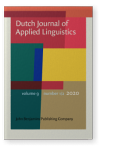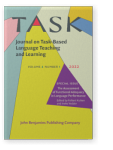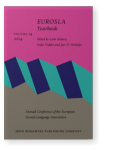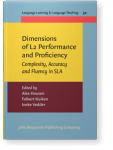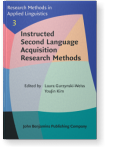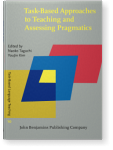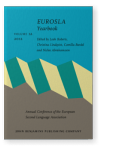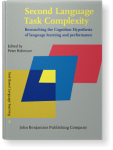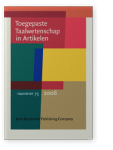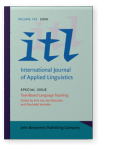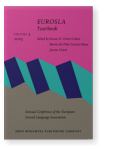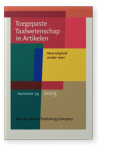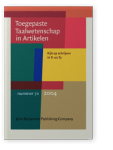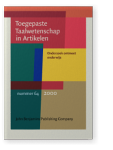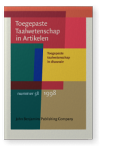Ineke Vedder
List of John Benjamins publications for which Ineke Vedder plays a role.
Journal
Titles
The Assessment of Functional Adequacy in Language Performance: Special issue of the Journal on Task-Based Language Teaching and Learning 2:1 (2022)
Edited by Folkert Kuiken and Ineke Vedder
Special issue of TASK 2:1 (2022) v, 158 pp.
Subjects Applied linguistics | Language acquisition | Language policy | Language teaching
EUROSLA Yearbook: Volume 14 (2014)
Edited by Leah Roberts, Ineke Vedder and Jan H. Hulstijn
[EUROSLA Yearbook, 14] 2014. x, 261 pp.
Subjects Applied linguistics | Language acquisition | Language teaching | Multilingualism
Dimensions of L2 Performance and Proficiency: Complexity, Accuracy and Fluency in SLA
Edited by Alex Housen, Folkert Kuiken and Ineke Vedder
[Language Learning & Language Teaching, 32] 2012. xii, 305 pp.
Subjects Applied linguistics | Language acquisition | Language teaching
2022 Chapter 14. Speaking: Complexity, accuracy, fluency, and functional adequacy (CAFFA) Instructed Second Language Acquisition Research Methods, Gurzynski-Weiss, Laura and YouJin Kim (eds.), pp. 329–352 | Chapter
This chapter focuses on the assessment of oral performance in a second language (L2), viewed from the perspective of task-based language assessment and instructed second language acquisition. The notion of L2 proficiency, as presented in the Common European Framework of References (Council of… read more
2022 Measurement of functional adequacy in different learning contexts: Rationale, key issues, and future perspectives The Assessment of Functional Adequacy in Language Performance: Special issue of the Journal on Task-Based Language Teaching and Learning 2:1 (2022), Kuiken, Folkert and Ineke Vedder (eds.), pp. 8–32 | Article
Linguistic performance elicited by language tasks has generally been operationalized in terms of complexity, accuracy, and fluency (CAF). However, this study argues that assessment of L2 proficiency is impossible without taking into account the adequacy and efficacy of L2 performance. To that… read more
2022 The assessment of functional adequacy in language performance: Introduction The Assessment of Functional Adequacy in Language Performance: Special issue of the Journal on Task-Based Language Teaching and Learning 2:1 (2022), Kuiken, Folkert and Ineke Vedder (eds.), pp. 1–7 | Review article
2018 Chapter 11. Assessing functional adequacy of L2 performance in a task-based approach Task-Based Approaches to Teaching and Assessing Pragmatics, Taguchi, Naoko and YouJin Kim (eds.), pp. 265–285 | Chapter
When assessing L2 performance in task-based research, dimensions of complexity, accuracy, and fluency (CAF) have typically been evaluated. Less attention has, however, been devoted to the functional dimension. This paper argues that it is critical to consider the functional dimension of L2… read more
2012 Epilogue Dimensions of L2 Performance and Proficiency: Complexity, Accuracy and Fluency in SLA, Housen, Alex, Folkert Kuiken and Ineke Vedder (eds.), pp. 299–302 | Article
2012 Complexity, accuracy and fluency: Definitions, measurement and research Dimensions of L2 Performance and Proficiency: Complexity, Accuracy and Fluency in SLA, Housen, Alex, Folkert Kuiken and Ineke Vedder (eds.), pp. 1–20 | Article
2012 Syntactic complexity, lexical variation and accuracy as a function of task complexity and proficiency level in L2 writing and speaking Dimensions of L2 Performance and Proficiency: Complexity, Accuracy and Fluency in SLA, Housen, Alex, Folkert Kuiken and Ineke Vedder (eds.), pp. 143–170 | Article
The research project reported in this chapter consists of three studies in which syntactic complexity, lexical variation and fluency appear as dependent variables. The independent variables are task complexity and proficiency level, as the three studies investigate the effect of task complexity on… read more
2012 Task complexity and interaction: (Combined) effects on task-based performance in Dutch as a second language EUROSLA Yearbook: Volume 12 (2012), Roberts, Leah, Christina Lindqvist, Camilla Bardel and Niclas Abrahamsson (eds.), pp. 164–190 | Article
This paper presents the overarching conclusions of three consecutive investigations into task-based L2 performance. It aims at giving a better understanding of how changes in the number of elements referred to in a task affect L2 production, and how this relates to cognitive task complexity.… read more
2011 Chapter 4. Task complexity and linguistic performance in L2 writing and speaking: The effect of mode Second Language Task Complexity: Researching the Cognition Hypothesis of language learning and performance, Robinson, Peter (ed.), pp. 91–104 | Chapter
The chapter discusses the question to what extent the effect of task complexity on linguistic performance in L2 writing and speaking is influenced by the mode in which the tasks have to be performed (oral versus written). The majority of studies which have been conducted so far in the framework of… read more
2006 Voorwoord Toegepaste Taalwetenschap in Artikelen 75, pp. 7–8 | Article
2006 The Effect of Task Complexity and Task Conditions on Foreign Language Development and Performance. Three Empirical Studies. Task-Based Language Teaching, Van den Branden, Kris and Machteld Verhelst (eds.), pp. 55–84 | Article
It has been argued that tasks constitute a valid alternative unit to sequence the language learning process, as opposed to linguistically defined syllabuses. Implementing this claim presupposes that it is possible to assess the cognitive and linguistic demands of tasks, so that they can be… read more
2005 Cognitive task complexity and second language writing performance EUROSLA Yearbook: Volume 5 (2005), Foster-Cohen, Susan H., María del Pilar García Mayo and Jasone Cenoz (eds.), pp. 195–222 | Article
This paper reports on a study in which two models proposed to explain the influence of cognitive task complexity on linguistic performance in L2 are tested and compared. The two models are Robinson’s Cognition Hypothesis (Robinson 2001a, 2001b) and Skehan and Foster’s Limited Attentional Capacity… read more
2005 Voorwoord Meertaligheid zonder meer, pp. 7–9 | Article
2004 De Relatie Tussen Cognitieve Taakcomplexiteit En Linguïstische Performance Bij Het Schrijven In T1 En T2 Kijk op schrijven in T1 en T2, pp. 23–32 | Article
According to Robinson's Cognition Hypothesis of task-based L2 development, cognitively more demanding tasks will lead to the use of lexically and syntactically more complex language (Robinson 2001a, 2001b, in press). A different viewpoint is held by Skehan (1998) and Skehan & Foster (1999, 2001),… read more
2000 Dictoglos als Vorm Van Samenwerkend Leren Onderzoek ontmoet onderwijs, pp. 49–58 | Article
This paper describes the dictoglos procedure in which learners try to reconstruct in small groups a text that has been read to them by the teacher. The procedure can be used for all kinds of learners irrespective of L1, L2 or acquisition level. The aim, theoretical assumptions and advantages of… read more
1998 Argumenterend Schrijven in t2 en t1 Toegepaste taalwetenschap in discussie, pp. 111–118 | Article
This paper reports on some of the results of a study of the 'acquisition of argumentative discourse by Dutch intermediate learners of Italian, carried out among a group of university students at the Department of Italian of the University of Amsterdam. It focuses on the comparison of the… read more
